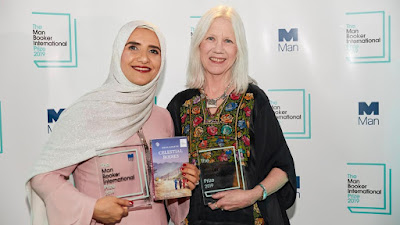Celestial Bodies : By Jokha Alharti Translated by Marilyn Booth.
Abdallah ibn Salayman is lucky. Born into ''easy times, times of plenty,'' he's the son of a prosperous Omani merchant and married to a woman he adores. Yet he experiences his good fortune anxiously.
The source of his father's wealth haunts him; more than one lonely death weighs on his heart; and when he asks his wife Maya, if she loves him, she laughs ''loud enough to shatter every wall in the new house.''
On a flight from Muscat to Frankfurt, Abdallah is plagued by soul-rattling dreams. ''Praise be to God who has blessed humankind with the ability to forget!'' he declares on waking.
In her novel ''Celestial Bodies'', the Omani author Jokha AIharthi inhabits this liminal space between memory and forgetting : the dark tension between the stories we tell and the stories we know.
Originally entitled ''Sayyidat al-Qamr'' [Ladies of the Moon''], the novel sircles between Abdallah's fitful, high-altitude dozing and the equally restless history of his ancestral home, the fictional desert village of al-Awafi.
Now a little more than an oasis of nostalgia [''What there is in al-awafi that isn't in Muscat is the graveyard''], it was once a hub for the slave trade, a practice that was not outlawed in Oman until 1970, as the gulf nation's oil wealth radically transformed its political might, economic infrastructure and social hierarchies.
''Celestial Bodies'' is the second of AIharthi's three novels, but it's a book of firsts : the first novel of an Omani woman to be translated into English and the first novel in Arabic to be awarded the Man Booker International Prize [which AIharthi shared with her translator, the Oxford academic Marilyin Booth].
Spanning several generations, from the final decades of the 19th century to the early years of the new millennium, it also marks an innovative reimagining of the family saga.
AIharthi avoids the languid ease chronology in favor of dozens of taut character studies, often no more than a page or two : despotic slave owners and the captive women who raise their children; kleptomaniacs and gossips; assured Bedouin businesswomen; violent profits; arms dealers; superstitious mothers, and aunts who are so tall they're ''like a skeletal minaret'.'
These vignettes are sharp-eyes, sharp-edged and carefully deployed in a multigenerational jigsaw that's as evasive as it is evocative. ''The style is a metaphor for the subject,'' explained the historian Bettany Hughes, who headed the Booker judging panel, ''subtly resisting cliches of race, slavery and gender.''
Booth's translation honors the elliptical rhythms of Arabic and the language's rich literary heritage. She imbues the book's numerous poetic extracts with lyricism and devotedly preserves the rhymes and cadence of its proverbs.
The World Students Society thanks review author Beejay Silcox.

.png)


0 comments:
Post a Comment
Grace A Comment!